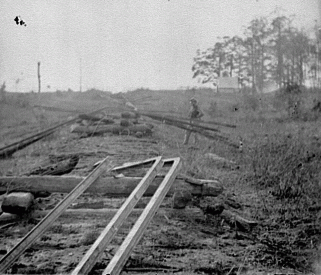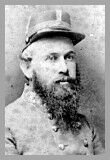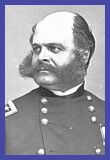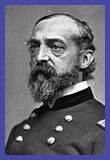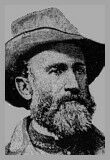|
|
| After
it became clear the Union Army was not going to chase Lee anymore, his forces
went into encampment. Hill's Division were encamped around the Bunker Hill
area. During the next few weeks Lee would officially promote Longstreet and
Jackson to Lieutenant General's and divide his army into two corps. It was
also made clear in Lee's communication to President Davis, that his next
choice for corps commander was AP Hill. Also during this period Jim Lane
was promoted to general and officially given command of the North Carolina
brigade, formerly led by the fallen Branch. Brockenbrough would continue
to lead Field's Virginian's temporarily, replacing Field who had been wounded
at Second Manassas. Col Bolling Holt was given official command of the 35th
Georgia, releasing Thomas from his regimental duties to concentrate on his
command of the entire brigade.
James Lane courtesy General Officers of the Civil War With the Union Army making no aggressive moves in the area, the Confederate Army took the opportunity to rest and rebuild its forces. New recruits joined, limited equipment was brought in, and life returned to a camp life routine. Within 4 weeks, the Hill Division had doubled in size to 9400 men. In the latter part of October, Hill's men moved to Berryville, and began destroying the Baltimore and Ohio Railroad. When completed, they had destroyed nearly twenty miles of track, coming within 4 miles of Harper's Ferry, which Union forces had again occupied. On the 7th of November, the first snow of the year blanketed Hill's men, who on the 9th moved to near Castleman's Ferry, on the road to Snicker's Gap. As snow fell on the barefoot Confederates, miles away Lincoln was making changes in the command structure of his army again. Disgusted that McClellan could organize an Army like no other, but didn't seemed to know how to use it, Lincoln replaced him with General Ambrose Everett Burnside on October 10th.
Ambrose Burnside courtesy General Officers of the Civil War
Burnside
had his Army at Warrenton, Longstreet was in Culpeper, and Jackson's men
were in the Shenandoah Valley. Burnside formulated a plan by which if he
could beat Lee to Fredericksburg and cross the river, he would command the
heights over the town and have a strong hold into southern territory, with
Richmond his ultimate goal. His Army set out secretly and had a day and half
head start before Lee realized what was happening. He quickly responded,
putting Longstreet enroute to Fredericksburg. A few days later, on the 22nd
of November, Jackson put his command in motion. Watching the Hill's troops
pass through Winchester, one young girl wrote in her diary "They were
very destitute, many without shoes, and all without overcoats or gloves,
although the weather is freezing. Their poor hands look so red and cold holding
their muskets in the biting wind" (Cornelia McDonald - A Diary With
Reminiscences of the War and Refugee Life - Nashville 1934 )
George Meade courtesy General Officers of the Civil War
The
morning of December 12 was foggy, and while unable to see to their front,
Hill's Division could hear the Federals moving into position. Opposing them
were Union troops under General's Meade and Gibbon. As the fog lifted around
10, Hill's men in front could see the Union forces advancing against them.
After a single cannon held the advance at bay for a time, the Union cannons
on the opposite bank pounded Hill's men for nearly an hour. Then they went
silent, and the Union assault commenced again. Now the Confederate cannons
opened up and for a time it appeared they would break the advance. But as
the Union and Confederate line grew close, the cannons fell quiet. Releasing
the gap was unprotected the Union Army advanced in force toward it and the
brigades protecting its flanks. This meant Lane and Archer. Both were hit
hard and pushed back, Lane giving up less ground than Archer. Brockenbrough
rushed his men to Archer's assistance, while Thomas rushed his men forward
to support Lane. Meanwhile, in the gap, the Union troops broke through on
an unsuspecting Gregg. Gregg's forces were completely taken off guard, and
fought bitterly to maintain their position. Pender's forces and Lane's left
flank came under attack as Gibbon's men joined the advance. Initially pushed
back, Pender's men held. Lane's retreat had stopped with Thomas' support
and now these two brigades held strong in the woods. On the right Brockenbrough's
help had stopped the rout of Archer's forces. And in the middle, Gregg's
men, less their mortally wounded commander, held on long enough for Jackson
to rush three new brigades under Jubal Early into the fight. Charging past
the dying Maxcy Gregg, who raised his hat in salute to them, Early's men
charged into the Union high point and began to push them back. Strained to
their limits, and unsupported, Meade's forces were slowly pushed back. By
two in the afternoon, the fight in Jackson's front was over. The blood bath
to the left on Longstreet's front would continue on late into the evening.
Jubal Early courtesy General Officers of the Civil War In this battle, the troops under Thomas, initially were only under Union artillery fire. But as Lane's North Carolinian's were being pushed back, the Georgian's rushed into the woods to their support. Facing them on the right were most likely the 4th, 8th, and 142nd Pennsylvanian's under Union Colonel Albert Magilton, of Meade's command. To the front were three brigade's of Brig Gen John Gibbon's Second Division. Lane's Carolinian's had successfully met the attacks of the first two brigades sent against them, but by the time the 1st Brigade attacked, they were out of ammunition and fell back into the woods. It was here that Thomas Geogian's came to their rescue. Facing the combined forces of Thomas and Lane were most likely soldiers from the 16th Maine (the Blanket Brigade), 94th, 97th (Conkling Rifle's), 104th, and 105th New York, 12th Massachusetts, and 88th Pennsylvania (Cameron Light Guards), among others. Two men of the 16th Maine were actually speared by bayonet tipped rifles thrown by Lane's retreating troops. Marker near where Thomas and Lane fought Gibbon and Meade Col Warren of the 142nd Pennsylvania, believed to be attacking Thomas' right flank, would later say in a speech "(Fredericksburg) is where our first genuine experience of war commenced-here is where we passed the first ordeal that was calculated to try men's souls--here is where we heard the first rattle of musketry and knew and realized that the leaden missiles, screaming past our ears, coming directly from the muzzles of well aimed muskets, in the hands of our common enemy, must deal death and destruction to our ranks, and summon many a good friend and comrade to lay his life upon the alter of his country and manfully meet his God." (History of the Regiment) The 35th would loose 14 dead and 41 wounded. The 142nd Pennsylvania lost over 170 men killed and wounded. To their front, the 16th Maine lost 230 of 417 men, and the 12th Massachusetts lost 105 of 258 men. On the whole the Hill Division lost 231 killed, 1474 wounded and 417 missing. Gibbon's Second Division had lost 1267 casualties out of 3500 men sent in.
Hill
would be criticized for this battle, like no other. His whereabouts during
the entire battle were unknown, and the hole he had left between two of his
regiments caused many men their lives. It was a mistake he would not repeat.
Meade would report 1,853 casualties out of 4700 engaged and Gibbon would
reported 1267 casualties. It was a costly mistake for the Union Army, but
a far worst mistake was being made against Longstreet on the hill. By the
next day, the Union Army had suffered a total of 12,653 casualties, compared
to Lee's 5,309. |
